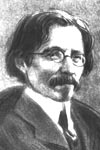The page of Sólem, Aléchem, English biography
Biography
Sholom Aleichem (February 18 (O.S.) = March 2 (N.S.), 1859 – May 13, 1916) was a popular humorist and Russian Jewish author of Yiddish literature, including novels, short stories, and plays. He did much to promote Yiddish writers, and was the first to pen children's literature in Yiddish.His work has been widely translated. The musical "Fiddler on the Roof" (1964), based on Sholom Aleichem's stories about his character Tevye the Milkman, was the first commercially successful English-language play about Eastern European Jewish life.
Born Sholem Yakov Rabinowitz (ru: Рабино́вич) to a poor patriarchal Jewish family in Pereyaslav (near Kiev), Ukraine. Sholem's mother died when he was thirteen. His first writing was alphabetical vocabulary of the epithets used by his stepmother. At the age of fifteen, inspired by Robinson Crusoe, he composed his own, Jewish version of the famous novel and decided to dedicate himself to writing. He adopted the pseudonym Sholom Aleichem, a common greeting meaning "peace be with you".
After completing Pereyaslav local school with excellent grades in 1876, he left home in search for work. For three years, he taught a wealthy merchant's daughter Olga Loev, who on May 12, 1883 became his wife. They had six children, including painter Norman Raeben—whose teaching Bob Dylan credits as an important influence on Blood On The Tracks—and Yiddish writer Lyalya (Lili) Kaufman. Lyalya's daughter Bel Kaufman is an American writer, author of the book Up the Down Staircase.
At first Sholom Aleichem wrote in Russian and Hebrew. From 1883 on, he produced over forty volumes in Yiddish, to become a central figure in Yiddish literature by 1890. Most writing for Russian Jews at the time was in Hebrew, the liturgical language used exclusively by the learned Jews. Sholom Aleichem wrote in Yiddish, a spoken language often derogatively called the "jargon".
Besides his prodigious output of Yiddish literature, he also used his personal fortune to encourage Yiddish writers. In 1888-1889, he put out two issues of an almanac, Die Yiddishe Folksbibliotek ("The Yiddish Popular Library") which gave important exposure to many young Yiddish writers. A third issue was edited, but never printed, because he lost his entire fortune in a stock speculation in 1890. Over the next few years, while continuing to write in Yiddish, he also wrote in Russian for an Odessa newspaper and for Voskhod, the leading Russian Jewish publication of the time, and in Hebrew for Hamelitz and for an anthology edited by Y.H. Ravnitzky.
Sholom Aleichem was often referred to as the "Jewish Mark Twain" because of the two authors' similar writing styles and use of pen names. Both authors wrote for both adults and children, and lectured extensively in Europe and the United States. When the two finally met late in life, however, Twain retorted that he considered himself the "American Sholom Aleichem."
After 1891 Sholom Aleichem lived in Odessa, but as waves of pogroms swept southern Russia in the early 1900s, he emigrated with the family in 1905, settling first in Switzerland, and in 1914, in the United States, where he made his home in New York City. He died there at the age of 57 and was laid to rest at the Brooklyn cemetery.
In 1997, a monument dedicated to Sholom Aleichem was erected in Kiev; another was erected 2001 in Moscow.
http://en.wikipedia.org




